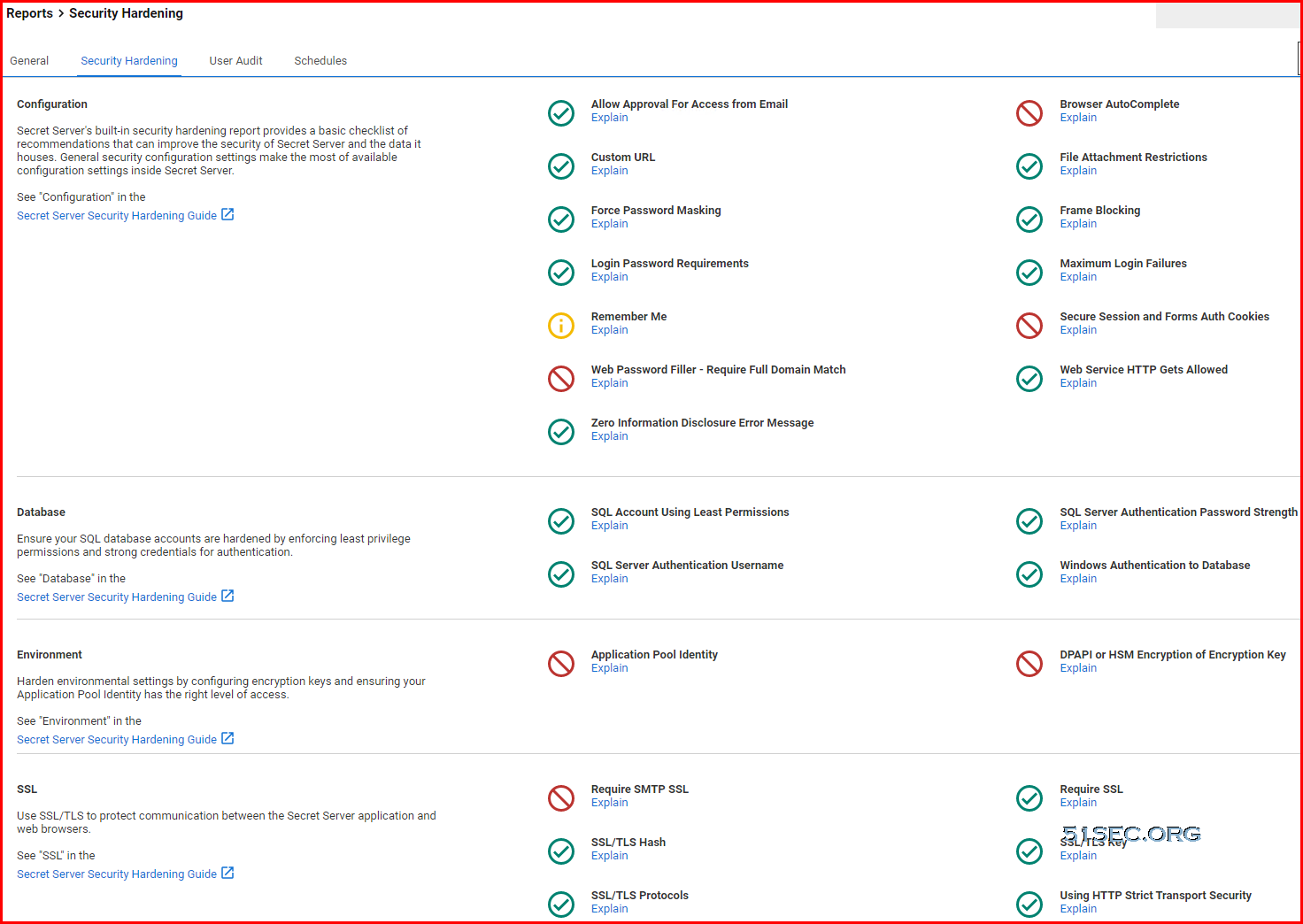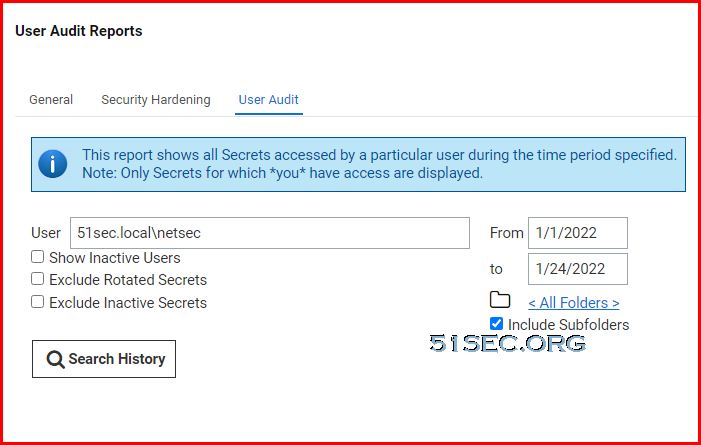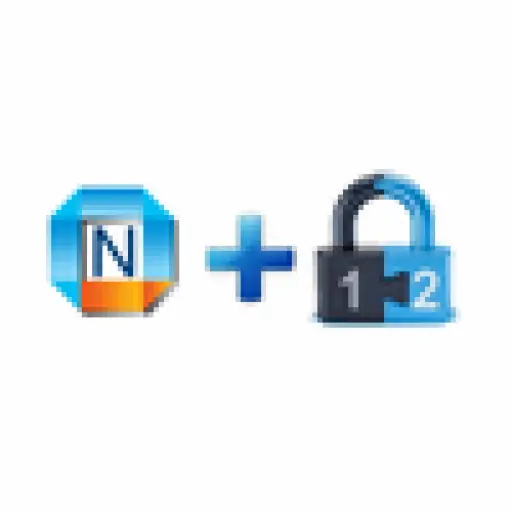This post is to summarize the reports from TSS.
Built-in Reports
Secret Server includes many pre-configured reports that you can run or use as templates for creating custom reports. Below are the reports shipped with current release of SS:Activity
- Custom Report Activity
- Database Configuration Audit
- Distributed Engine Activity (Professional)
- Dual Control Audit
- Event Subscription Activity (Professional)
- Folder Activity
- Internal Communication Changes
- IP Address Range Audit
- License Audit
- Secret Activity
- Secret Activity Today
- Secret Activity Yesterday
- Secret Template Activity (Professional)
- Session Recording Errors
- Unlimited Administrator Behavior
- Users Activity
Discovery Scan
Note: These are available in Professional edition. In prior versions they are available only in Enterprise Plus.
- Discovery Scan Status
- What computers in Active Directory no longer exist?
- What computers have been successfully scanned?
- What computers that exist have not been successfully scanned?
- What Secrets failed to import by Discovery?
- What Secrets are pending import by Discovery?
Folders
- What folders can a user see?
- What folders can all users see?
- What folder permissions exist?
- What folder permissions exist for groups?
Groups
- Group Membership
- Group Membership By Group
Legacy Reports
- Secret Server Usage
- Secret Expiration Health
- Secret Template Distribution
- Top Ten Viewers (Professional)
Password Compliance
- What Secrets Do Not Meet Password Requirements?
- Secret Password Compliance Statuses
Report Schedules
Report Schedules (Professional)
Roles and Permissions
- What role permissions does a user have?
- What role assignments exist?
- What role permission assignments exist?
Secrets
- Secret Count per Site
- Secret Permissions Mismatch
- What file types have been uploaded to Secrets?
- What file types have been uploaded to Secrets? (Pie Chart)
- What Hooks and Dependencies use a script? (Enterprise Plus/Premium add-on)
- What Secret permissions exist for a group?
- What Secret permissions exist for a user?
- What Secret permissions exist?
- What Secrets are expiring this week?
- What Secrets can a user see?
- What Secrets can all users see?
- What Secrets changed passwords in the last 90 days?
- What Secrets Do Not Have Distributed Engines? (Professional)
- What Secrets don’t require approval? (Enterprise/Premium)
- What Secrets have been accessed by a user?
- What Secrets have been accessed by an impersonated user?
- What Secrets have been accessed?
- What Secrets have Distributed Engines?
- What Secrets have Expiration?
- What Secrets have failed Heartbeat? (Professional)
- What Secrets have not changed passwords for over 90 days?
- What Secrets require approval? (Enterprise/Premium)
- What Secrets require Comments?
Secret Policy
- What Folders have Policies Assigned?
- What Secrets have different Policies than their folders?
- What Secrets have policies assigned?
Users
- Failed login attempts
- Who hasn’t logged in within the last 90 days?
- What users have had an admin reset their password?
- Secret Template Permission by User
Note: You can find additional reports in the Custom Report Gallery.
Built-in Security Hardening Reports
The Security Hardening Report checks aspects of SS to ensure security best practices are being implemented. While SS runs with all the items failing, administrators should be aware of possible security issues within an installation. For details on this, see Reports Security Hardening Tab.
Local Account Discovery Report
The User Audit Report shows all secrets accessed by a user during a specified period.Custom Report Download
31 Custom report available for downloading: https://my.thycotic.com/products_secretserver_customreportgallery.html
| Name | Description | Download | Published | Uploaded By |
| Which users have accessed Secrets that they did not create? | Shows a log of all actions done to Secrets by users who did not create the secret. This report is useful if you expect most users to be primarily using their own Secrets. | 237 | 7/7/2010 | David A |
| Which Secrets are expired? | Shows all Secrets that have expired. This is useful for showing which passwords should be changed. | 255 | 7/7/2010 | David A |
| Which Secrets will expire by a certain date? | Shows which Secrets will expire by a given date. This is useful for finding out which Secrets will soon expire. | 104 | 7/7/2010 | David A |
| Which Secrets expire in a certain date range? | This is useful for finding out which Secrets will expire in a certain date range in the future. | 65 | 7/7/2010 | David A |
| Which Secrets are out of sync? | Shows which Secrets have the incorrect password stored in Secret Server. | 170 | 7/7/2010 | David A |
| Which users have two factor authentication enabled? | Shows which users have two factor enabled and what form of two factor they are using. This is useful for security hardening purposes. | 348 | 7/7/2010 | David A |
| Which remote password changing secrets will never expire? | Shows all remote password changing secrets that will never expire. This is useful for assessing vulnerability on network passwords that may never change. | 73 | 7/7/2010 | David A |
| Which remote password changing secrets are set to expire but do not have autochange enabled? | Shows the secrets that can have their passwords remotely changed, but are not set to change on expiration. | 145 | 7/7/2010 | David A |
| Which Secrets have been accessed by users who do not currently have view permissions on the Secret? | Shows all Secrets that have been accessed in the past where the users currently do not have view permissions. This is useful for assessing vulnerabilities for passwords that should be changed. | 140 | 7/7/2010 | David A |
| Which secrets are DoubleLocked? | Shows a list of all secrets that are DoubleLocked. This allows admins to see if they have forgotten to DoubleLock any sensitive secrets. | 53 | 7/7/2010 | David A |
| Which secrets have Check Out enabled? | This report shows which Secrets have Check Out enabled. It also shows which Secrets are checked out. | 124 | 7/7/2010 | David A |
| Which Secrets Require Approval to Access? | This report will indicate which Secrets require users to request access to view. | 66 | 8/14/2014 | Tucker |
| What Folders Does User Have Owner? | Displays all folders the selected user has owner on. | 112 | 7/29/2011 | Tucker |
| What Folder Permissions Exists For Folders the User Has Owner? | 135 | 7/29/2011 | Tucker | |
| Secret Activity by Owner | Shows the Secret Activity for all Secrets where the selected user is an Owner. | 177 | 9/20/2011 | Jacob |
| Password Compliance Distribution | Shows the distribution of passwords that are compliant and non-compliant with their Password Requirements. | 127 | 12/5/2011 | Jonathan Cogley |
| Show Secrets with Duplicate Secret Names | Shows active Secrets that have the same Secret Name (possible duplicates?). | 321 | 12/6/2011 | Jonathan Cogley |
| Event Subscription Log | Shows all the events that each user has received | 33 | 1/24/2012 | Jonathan Cogley |
| Which folders are not inheriting permissions? | 59 | 1/25/2012 | Jonathan Cogley | |
| Ran out of user licenses | Shows a message when we have run out of user licenses in the last 7 days. | 85 | 1/26/2012 | Jonathan Cogley |
| What folders can groups see? | Shows all the folders visible by group | 100 | 1/27/2012 | Jonathan Cogley |
| Which folders are not inheriting permissions? (showing permissions) | Shows folders that are not inheriting permissions and who has access to them | 71 | 1/30/2012 | Jonathan Cogley |
| What Secrets can a user not see? | Shows all the Secrets that a user cannot access. | 77 | 1/30/2012 | WebUploadUser |
| Show Owners of all Secrets | Shows all the owners of Secrets in Secret Server. | 262 | 2/7/2012 | Jonathan Cogley |
| Secrets that do not inherit permissions | Shows Secrets that have explicit permissions set on them | 292 | 4/20/2012 | Jonathan Cogley |
| What Secrets Have Dependencies | Shows Secrets with Dependencies and the current status of those Dependencies. | 102 | 7/31/2012 | Ben Yoder |
| Secret Activity by Group | Shows Secret activity by Group | 138 | 8/14/2014 | WebUploadUser |
| Secrets Exported | Shows Secrets Exported through the administrator clear text export by date range. | 653 | 10/4/2013 | WebUploadUser |
| What errors occured for Computers in Active Directory that no longer exist? | Shows computers that have not connected to Active Directory 3 months prior to the selected date and the most recent error message from the scan. | 72 | 7/1/2014 | Ben Yoder |
| Which Secrets does no one have access to? | This can be useful in the case that you need to retrieve Secrets that currently have no permissions assigned because they were only accessed by a user who is now disabled | 121 | 8/14/2014 | WebUploadUser |
| Secrets in middle of password change | This could tell you which secrets are possibly stuck in the middle of a password change | 96 | 3/28/2017 | WebUploadUser |
Local Account Discovery Report
SELECT
c.ComputerName AS 'Host',
ca.AccountName AS 'Account_Name',
ST.ScanItemTemplateName AS 'Account_Type',
c.ComputerVersion AS 'Operating_System',
CASE
WHEN ca.PasswordLastSet IS NULL then 'Never'
ELSE CONVERT(nvarchar,ca.PasswordLastSet)
END AS 'Password Last Set',
CASE
WHEN ca.ScanItemTemplateId =13 and ca.IsLocalAdministrator = 1 THEN 'Built-in Administrator'
WHEN ca.ScanItemTemplateId =13 and ca.IsLocalAdministrator = 0 THEN 'Standard_User'
END AS 'Account Privilege',
CASE
WHEN ca.ScanItemTemplateId =13 and ca.HasLocalAdminRights = 1 THEN 'Yes'
WHEN ca.ScanItemTemplateId =13 and ca.HasLocalAdminRights = 0 THEN 'No'
END AS 'Has Local Admin Rights',
ou.Path 'Organizational Unit'
FROM
tbComputer c
JOIN tbComputerAccount ca
ON
ca.ComputerID = c.ComputerId
JOIN tbOrganizationUnit OU
ON c.OrganizationUnitId = ou.OrganizationUnitId
JOIN tbScanItemTemplate ST
on ca.ScanItemTemplateId = ST.ScanItemTemplateId
Show All Secrets, Users, Folder Path and Last Access Date
Select distinct a.SecretId, SecretName, UserName, FolderPath, LastAccessedDate
from
(select SecretID, max(DateRecorded) as LastAccessedDate
from tbAuditSecret
where Action like 'VIEW%'
group by SecretID) a
inner join tbSecret s on s.SecretID = a.SecretId
inner join tbFolder f on f.FolderID = s.FolderId
inner join tbAuditSecret au on au.SecretId = a.SecretId and LastAccessedDate = au.DateRecorded
inner join tbUser u on u.UserId = au.UserId
order by SecretId
Active Secret Sessions and Count
SET TRANSACTION ISOLATION LEVEL READ COMMITTED
SELECT IsNull(f.FolderPath, 'No Folder') AS 'Folder Path', s.SecretId, SecretName, st.SecretTypeName AS [Secret Template], StartDate from tbSecretSession ss
INNER JOIN tbSecret s on s.SecretID = ss.SecretId
INNER JOIN tbSecretType st on s.SecretTypeID = st.SecretTypeID
LEFT JOIN tbFolder f on s.FolderID = f.FolderID
WHERE ss.Active = 1 and LaunchedSuccessfully = 1
SET TRANSACTION ISOLATION LEVEL READ COMMITTED
SELECT count(1) as 'Session Count' from tbSecretSession ss
INNER JOIN tbSecret s on s.SecretID = ss.SecretId
WHERE ss.Active = 1 and LaunchedSuccessfully = 1
Service Accounts Discovery Report
aSELECT
CASE
WHEN ds.DomainId = '1' THEN 'EDITSQLTOPUTDOMAINHERE' -- Adjust for your domains
END AS 'Domain',
c.ComputerName AS 'Host Name',
c.ComputerVersion AS 'Operating System',
cd.AccountName AS 'Account Name',
cd.DependencyName AS 'Dependency Name',
sdt.SecretDependencyTypeName AS 'Dependency Type',
c.LastPolledDate AS 'Last Scanned',
s.SecretName AS 'Secret Name'
FROM
tbComputer c
JOIN tbComputerDependency cd ON cd.ComputerID = c.ComputerId
JOIN tbSecretDependencyType sdt ON sdt.SecretDependencyTypeId = cd.SecretDependencyTypeID
JOIN tbSecretDependencyTemplate sdtm ON cd.ScanItemTemplateId = sdtm.ScanItemTemplateId
AND cd.SecretDependencyTypeID = sdtm.SecretDependencyTypeId
JOIN tbDiscoverySource ds ON c.DiscoverySourceId = ds.DiscoverySourceId
LEFT OUTER JOIN tbSecret s ON s.SecretID = cd.SecretId
Where
cd.AccountName like '%' + #CUSTOMTEXT + '%'
AND -- Custom filters to remove non-important tasks
cd.DependencyName NOT like 'Optimize Start Menu Cache Files%'
AND
cd.DependencyName NOT like 'User_Feed_Synchronization%'
AND
cd.DependencyName NOT like 'CreateExplorerShellUnelevatedTask'
ORDER BY c.ComputerName asc
Filter Discover Report
Show a report to see all unmanaged accounts:
/* Domain accounts discovered in Secret Server that are not managed in Secret Server */
/* To filter the results to only a specific OU, uncomment out the
AND ou.Path = 'SpecificOU\SpecificOU'
line and change SpecificOU\SpecificOU to the folder path for the OU to filter */
/* To include a specific OU and its sub-OUs, uncomment out the AND ou.Path line
and edit it to
AND ou.Path CONTAINS 'SpecificOU\SpecificOU'
and change SpecificOU\SpecificOU to the folder path for the OU to filter */
SELECT
isnull(Domain,ds.Name) AS 'Discovery Source / Domain'
,ou.Path
,ca.AccountName AS 'Account Name'
FROM tbComputerAccount ca
INNER JOIN tbDiscoverySource ds on ca.DiscoverySourceId = ds.DiscoverySourceId
LEFT JOIN tbDomain d ON d.DomainId = ds.DomainId
LEFT JOIN tbOrganizationUnit ou ON ou.OrganizationUnitId = ca.OrganizationUnitId
LEFT JOIN tbSecret s ON s.ComputerAccountId = ca.ComputerAccountId
WHERE ds.Active = 1
AND ((d.EnableDiscovery is null) OR (d.EnableDiscovery = 1))
AND s.ComputerAccountId IS NULL
AND ca.OrganizationUnitId IS NOT NULL
/* AND ou.Path = 'SpecificOU\SpecificOU' */
GROUP BY isnull(Domain,ds.Name), ou.Path, ca.AccountName
HAVING COUNT(ca.AccountName) > 0
ORDER BY
1,2,3 ASC
SELECT
tc.DiscoverySourceId AS 'DiscoverySourceId',
tds.Name AS 'DiscoverySourceName',
tca.AccountName AS 'Account',
tc.ComputerName AS 'Host Name',
CONVERT(VARCHAR(20),tc.LastPolledDate,107) AS 'Last Scanned'
FROM
tbComputer tc
JOIN tbComputerAccount tca
ON tc.ComputerId=tca.ComputerId
JOIN tbDiscoverySource tds
on tc.DiscoverySourceId=tds.DiscoverySourceId
LEFT JOIN tbSecret ts
ON ts.ComputerAccountId = tca.ComputerAccountId
WHERE ts.ComputerAccountId IS NULL
ORDER BY tca.AccountName asc
Find out secrets enabled Password Auto Change
SELECT
Main.[Folder Path]
,Main.SecretName AS [Secret Name]
,Main.[Secret Template]
,Main.SecretId
,LEFT(Main.Approvers,LEN(Main.Approvers)-1) As "Approvers"
FROM(
SELECT DISTINCT
s2.SecretId
,s2.SecretName
,ISNULL(f.FolderPath, N'No folder assigned') as [Folder Path]
,st.SecretTypeName AS [Secret Template]
,(SELECT DISTINCT
vg.DisplayName + ', ' AS [text()]
FROM dbo.tbSecret s1
JOIN tbSecretGroupApproval sga
ON s1.SecretId = sga.SecretId
JOIN vGroupDisplayName vg
ON vg.GroupId = sga.GroupId
WHERE s1.SecretId = s2.SecretId
FOR XML PATH ('')
) [Approvers]
FROM dbo.tbSecret s2
LEFT JOIN tbFolder f WITH (NOLOCK)
ON s2.FolderId = f.FolderId
INNER JOIN tbSecretType st WITH (NOLOCK)
ON s2.SecretTypeId = st.SecretTypeId
WHERE s2.AutoChangeOnExpiration = 1
AND
st.OrganizationId = #ORGANIZATION
AND
s2.Active = 1
) [Main]
ORDER BY [Folder Path], [Secret Name]
Listing all columns from table dbo.tbSecret
- Select SecretID,SecretName,FolderId from dbo.tbSecret
Select *
From dbo.tbSecret
where AutoChangeOnExpiration = 1











No comments:
Post a Comment